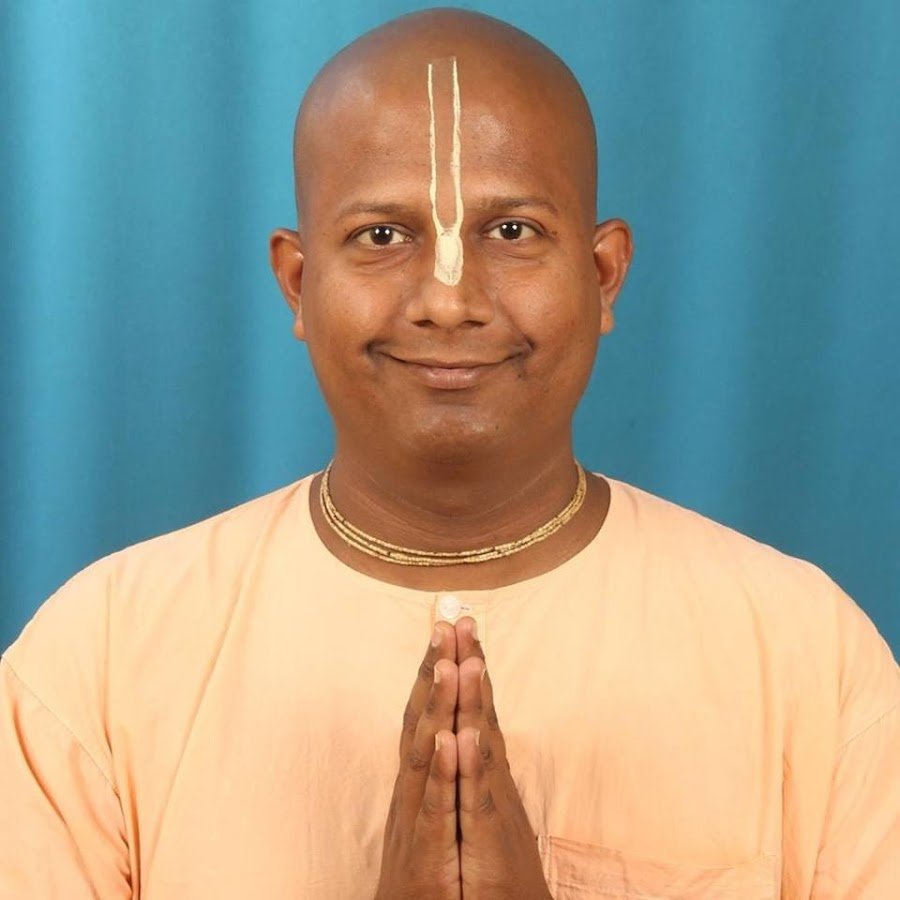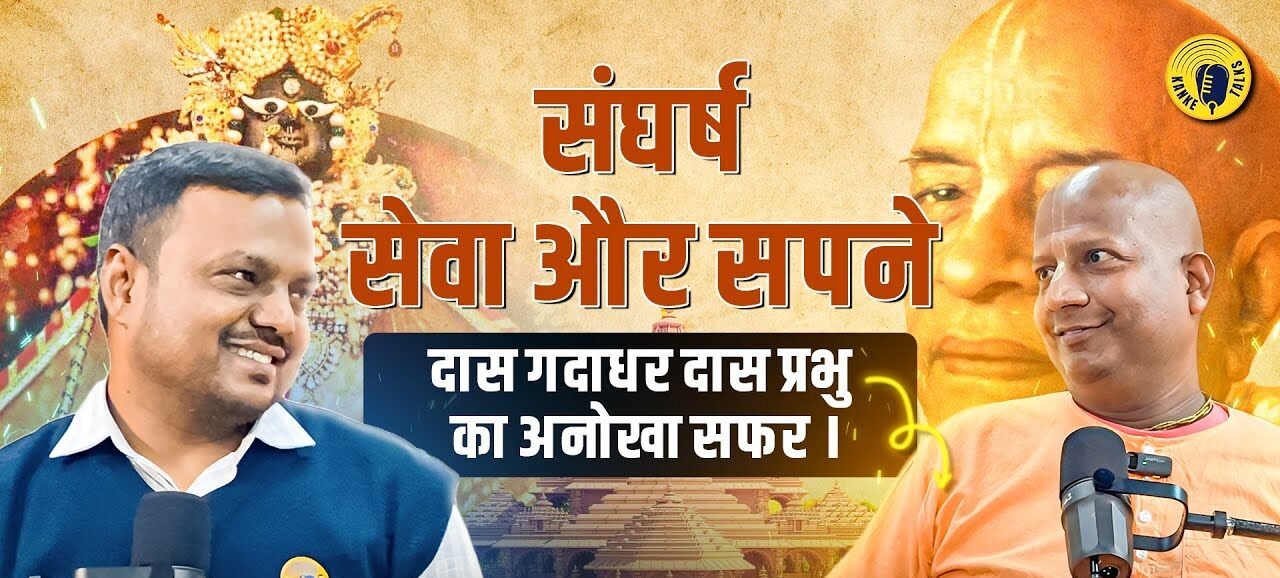The Voice of Truth: Das Gadhadar Das on Faith, Science, and the Crisis of the Human Soul
“Because every story deserves to be told.”
In the age of viral reels and fast-paced digital lives, it’s rare to find a voice that urges you to pause, reflect, and listen to something deeper—your own conscience. Das Gadhadar Das, a spiritual teacher and engineer by education, stands as that rare voice. In his deeply reflective yet unapologetically bold discussion on the Kake Talks podcast, he speaks with a clarity that is both confronting and comforting. He doesn’t seek to appease modern minds; he challenges them.

Spirituality in the Age of Science
Early in the conversation, Prabhuji makes a powerful, controversial statement: “Science is the dust beneath the Vedas.” Not because science is wrong, he says, but because it is incomplete. He’s quick to clarify—he’s not anti-science. An engineer himself, he respects its contributions. But when science forgets the human soul, when it forgets consciousness, values, and purpose, it becomes a cold machine.
He raises questions modern thinkers often avoid: Why do scientists working on revolutionary projects sometimes disappear? Why do breakthroughs that could liberate us—like alternative energy—never see daylight? He ties it to capitalism’s control over knowledge: science thrives when it’s profitable. Otherwise, it’s buried.
He contrasts this with Vedic wisdom, which he says focuses not just on the how, but on the why. “The science of consciousness,” he says, “is missing in modern labs. But it’s all there in the Gita. The connection between the mind, ego, intelligence—that’s the real science.”
The Disconnected Human
Our society has evolved technologically but, according to Das, spiritually we are regressing. “Earlier, people lived to 100,” he observes. “Now, people are dying of heart attacks at 40.” It’s not just about biology, he insists—it’s about the erosion of values, the disintegration of family bonds, the disrespect for elders, and the rise of materialistic desires.
“People today are partying while their husbands are buried in cement.”
Das doesn’t blame science or social media alone. He points to a bigger problem: a loss of dharma—a moral compass. Where once the Bhagavad Gita was recited in homes, now it’s replaced by memes and meaningless distractions. “People quote Krishna but forget the philosophy,” he laments.
“Even Krishna, after giving all his wisdom, said to Arjun—‘This is my opinion. Do what you feel is right.’ That’s humility. That’s real leadership.”
The Delusion of Progress
One of the most striking parts of his talk is the critique of our so-called “progress.” He questions why vehicles still run on fossil fuels when steam engines could suffice, why atomic theory is treated as gospel, and why medical research is often dictated by commercial gain rather than human good.
“You say we came from monkeys,” he mocks. “But we had Dhruv and Prahlad millions of years ago—fully realized humans.” For him, spiritual knowledge predates and outpaces modern evolution theories. It’s not pseudoscience, he says, but a different framework of understanding the cosmos and human purpose.
Diet, Thought, and the Soul
Our diet, he insists, is deeply connected to our thoughts. Citing the Gita, he categorizes food into three types:
- Satvik food — simple, plant-based, and non-violent; nourishes the mind and soul.
- Rajsik food — rich, spicy, indulgent; feeds ambition but also restlessness.
- Tamsik food — stale, overly processed, meat-heavy; fosters darkness and lethargy.
He shares a tale of a saint who unknowingly carried stolen golden utensils in his bag—placed there because he had eaten a stolen vegetable. It’s symbolic: what we consume affects our karma. The food may nourish us, but if born of violence or theft, it taints our being.
The Role of Marriage and Moral Commitment
Marriage, he says, is a sacred bond. “When you accept someone as your spouse, it’s not just physical—it’s spiritual.” Even disagreements should be part of growth, not a reason for betrayal.
“If you feel the bond is so broken, at least part peacefully. Don’t kill your partner and hide the body in a drum. Divorce, don’t destroy.”
On Capitalism, Media, and Morality
He’s critical of how capitalism infiltrates our beliefs. “You made bombs, but didn’t teach bomb ethics. You made knives, but not knife morality.”
Science, he says, creates tools faster than it creates wisdom. Morality should be part of science. If it’s not, it must be.
On media, he adds: “Social media shows what is—but should it show everything? Should every scandal be amplified until people lose faith in society?” The media, he says, should elevate, not just expose.
True Yoga, True Health
Today’s gym culture, he argues, focuses on appearance, not health. “People build six-packs but can’t climb hills.” He advocates Surya Namaskar, Akharas, and mud wrestling for real fitness.
“Fat is like stored energy—it helps during illness. But don’t worship abs over actual health.”
A Call for Post-40 Simplicity
To those over 40, he advises: stabilize, simplify, spiritualize. “After 40, a man’s life belongs to his family. If you still crave wild adventures, check your values.”
“At 25, risk. At 45, reflect. Jumping around after 45 won’t bring joy—it brings misery.”
Why the Vedas Matter Today
Das emphasizes: the Vedas are not outdated—they are underutilized. They offer blueprints for conscious living, covering psychology, cosmology, dietetics, and ethics.
“You want to understand psychology? The Gita explains the mind better than Freud.”
Conclusion: A Voice Worth Hearing
Das Gadhadar Das isn’t for everyone. His words sting, provoke, and sound ancient—but beneath the sharpness is deep compassion and a call to truth.
He doesn’t just criticize—he invites healing. He reminds us: true progress isn’t just about towers and speed—it’s about becoming better humans.

No responses yet